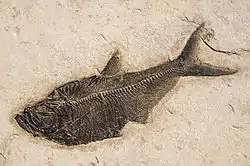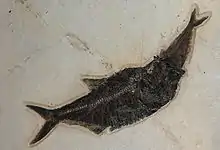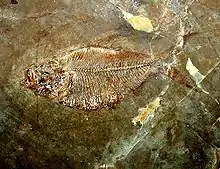Diplomystus
Diplomystus is an extinct genus of freshwater clupeomorph fish distantly related to modern-day extant herrings, alewives, and sardines. The genus was first named and described by Edward Drinker Cope in 1877. There are seven species of Diplomystus: D. dentatus (Cope, 1877), D. birdii, D. dubetreiti, D. shengliensis (Chang 1983), D. kokuraensis (Uyeno 1979), D. primotinus (Uyeno 1979), and D. altiformis.
| Diplomystus | |
|---|---|
 | |
| D. dentatus from Eocene of Wyoming | |
| Scientific classification | |
| Kingdom: | |
| Phylum: | |
| Class: | |
| Order: | |
| Family: | Ellimmichthyidae |
| Genus: | Diplomystus Cope, 1877 |
| Species: | See text |


D. dentatus (Cope, 1877) is well known from lower Eocene deposits from the Green River Formation in Wyoming. Specimens range from larval size to 65 cm and are commonly found in close association with the extinct herring Knightia sp. The Green River Formation is the remnant of a large lake whose mud would eventually be transformed into soft calcite-bearing shale. D. kokuraensis (Uyeno 1979), D. primotinus (Uyeno 1979), and D. altiformis were dominant members of an Early Cretaceous lake fauna (the "Diplomystus-Wakinoichthys Fauna") in what is now Japan and Korea.[1]
References
- Yabumoto, Yoshitaka; Seong-Young Yang; Tae-Wan Kim (2006). "Early Cretaceous Freshwater Fishes From Japan and Korea" (PDF). Japan Paleontological Society Korea. 22 (1): 119–132.
Bibliography
- Grande, Lance (1982). "A revision of the fossil genus Diplomystus : with comments on the interrelationships of clupeomorph fishes". American Museum Novitates. New York, New York, USA: American Museum of Natural History. 2728. hdl:2246/5342.
- Nelson, Gareth J. (1973). "Notes on the structure and relationships of certain Cretaceous and Eocene teleostean fishes". American Museum Novitates. New York, New York, USA: American Museum of Natural History. 2524. hdl:2246/2730.
- Zhang, Miman; John G. Maisey (2003). "Redescription of Ellimma branneri and Diplomystus shengliensis : and relationships of some basal clupeomorphs". American Museum Novitates. New York, New York, USA: American Museum of Natural History. 3404. hdl:2246/2830.
